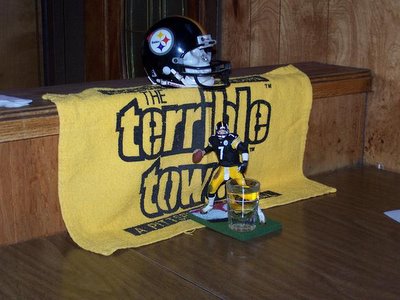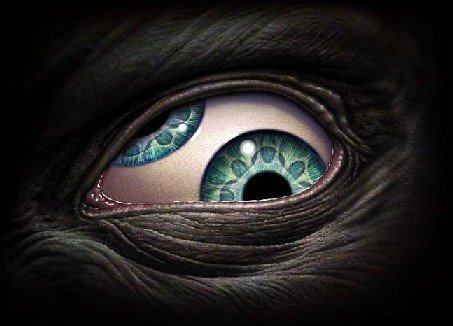So I don't know if you've heard or not...

So it's been a few days now and, yes... the Steelers are still Super Bowl champions. I guess it still hasn't really sunk in all the way but the afterglow lingers. Still though, the chirping about the refereeing from the Seattle fans and my dumbass friends trying to take the luster off the Super Bowl victory deserves a response. Not by me though, as any response from me would involve ranting, swearing and foaming at the mouth. I'm talking about opinions expressed by legitimate sports writers like Gene Wojciechowski who writes:
"Sorry, but Seahawks receiver Darrell Jackson pushed off in the end zone. Did it gain him an advantage? Maybe. Maybe not. All that matters is that the official standing nearby -- a lot closer than John Madden, you or me -- thought so. Instead of a touchdown, Seattle settled for a 3-0 first quarter lead.
Sorry, but Roethlisberger might have broken the plane of the goal line on his second quarter 1-yard TD dive. Or not. That's what matters, right? Not where he landed, but if the ball broke the plane? The play was reviewed and upheld. What else was anyone supposed to do? And while there are no guarantees, if the ball had been spotted just short of the goal line, the Steelers were 100 percent on fourth-and-goals this season.
Sorry, I truly don't know whether Sean Locklear held Clark Haggans on that key fourth quarter call. Even if he didn't, and it was first-and-goal from the Pittsburgh 1, then what? If you can't guarantee Pittsburgh's scoring on fourth-and-inches in the second quarter, you can't guarantee Seattle's scoring on first-and-goal from the 1. Why? Because funny things happen, like the Bettis fumble against Indy. Or Roethlisberger's underthrowing a wide-open Cedrick Wilson against Seattle, costing the Steelers a sure touchdown or a likely field goal (the ball was at the Seahawks' 7). Instead, Kelly Herndon intercepted the crummy pass, returned it 76 yards and Seattle scored three plays later.
No one can deny there were questionable calls during the game. But before Holmgren and Latte Nation start whining about playing "the guys in the striped shirts as well,'' perhaps a history lesson is in order.
The striped shirts didn't cause tight end Jerramy Stevens to drop four passes. The striped shirts didn't cause the Seahawks defense to give up a Steelers first down on a third-and-28 situation (which later led to the Roethlisberger disputed TD). The striped shirts didn't cause the Seahawks defense to give up the longest touchdown run in Super Bowl history. They also didn't cause Etric Pruitt to sprint up from his safety position, only to be fooled by the trick play that resulted in Randle El's 43-yard TD pass to Ward (and by the way, if everyone knows the Steelers like to run gadget plays near midfield, don't you think the Seahawks knew it too?). Or cause Seahawks quarterback Matt Hasselbeck to throw a killer interception with nearly 11 minutes left in the game and Seattle trailing by only four points.
Enough already with the whining. The Seahawks had their chances. Plenty of them to overcome the Steelers and, if they insist, the refs, too.Holmgren, who didn't exactly distinguish himself in the waning minutes of both halves, is no doubt suffering some post-Super Bowl anger. Perfectly understandable, especially in front of the thousands who greeted the team upon its return to Seattle. But days, weeks, months from now, when he's able to think more clearly, he'll realize the only people to blame for the loss were wearing Seahawks metallic blue, not black and white."
Or a couple of things from TMQ himself, Gregg Easterbrook:
"Four of the six big officiating decisions went against Seattle. Does this mean a pro-Steelers bias, as some in the sports yak world are saying, or perhaps a slap at Mike Holmgren by the officiating guild? (Holmgren ripped the officials after the Giants-Seahawks contest; conspiracy theory says the zebras were seeking vengeance.) The two decisions that favored the Hawks were the fourth-quarter replay reversal that gave possession, initially awarded to Pittsburgh, back to Seattle; and the no-call of a block in the back by Seattle during Kelly Herndon's record interception return. Of the four big decisions that favored the Steelers, two seemed correct to me. On the offensive pass interference nullifying Seattle's first touchdown, Darrell Jackson pushed off with the ball in the air and gained advantage by doing so. Had the physics of the play been exactly the same, except Jackson a defender, television announcers would have been screaming, "Interference!" It's true, as some said, that Michael Irvin often got away with push-offs -- but he shouldn't have. And when Roethlisberger dove for Pittsburgh's first touchdown, at game speed I thought, "He didn't make it." But replays showed the tip of the ball above the goal line, and Rule 3, Section 38 reads, "A touchdown is the situation is which any part of the ball, legally in possession of a player inbounds, in on, above, or behind an opponent's goal line."
On the flip side, the holding penalty against Sean Locklear, nullifying what would have been a Seahawks' first-and-goal on the Pittsburgh 1 in the fourth quarter, seemed a bad call. On almost every Pittsburgh offensive play, a Steelers blocker grabbed as briefly as Locklear grabbed on the down in question; if it was illegal for one team, it should have been illegal for both teams. Owing to the dubious penalty, instead of first-and-goal, Seattle ended up throwing an interception on third-and-long. That interception undid the Seahawks, as they staged a 13-play, 81-yard drive that ended in no points, and undid the Super Bowl itself, converting what might have been a fabulous ending into a lackluster fourth quarter. Seattle faithful also have a legitimate complaint that the fourth-quarter 15-yard penalty on Hasselbeck for "low block" was inexplicable. The rulebook states that during a turnover, neither team may block below the waist. But Hasselbeck wasn't blocking -- he was making the tackle. Check the official Game Book, at 10:54 of the fourth quarter. The league's own Game Book credits Hasselbeck with the tackle on a play where the penalty could be valid only if Hasselbeck was not making a tackle!"
However, in his next column, TMQ added:
"Yesterday I wondered how Matt Hasselbeck could have been called for "low block" on the same play on which he was credited with a tackle. Andy Neidlinger of Wayne, Pa., was among many to note that in the Pittsburgh at Indianapolis regular-season game, Jeff Hartings of the Steelers was called for low block in the same situation. After an interception, he went low to get past a defender and take down the intercepting player, and was called for low block and credited with the tackle simultaneously. See the Game Book entry at 27 seconds in the second quarter. Jim Haywood adds Bill Leavy was the referee in both the Super Bowl and that game. The rule says that following a change of possession, neither team may block below the waist. On both penalties, Hasselbeck and Hartings made low contact with a defender for the intercepting team, then legally tackled the intercepting player."
Mmm hmm....
A cool statistic, also from TMQ: In succession Pittsburgh held the league's fourth-highest scoring team, Cincinnati, averaging 26.3 points, to 17 points; the league's second-highest scoring team, Indianapolis, averaging 27.4 points, to 18 points; the league's seventh-highest scoring team, Denver, averaging 24.7 points, to 17 points; the league's highest-scoring team, Seattle, averaging 28.2 points, to 10 points.
Great run to get into the playoffs, great run to get into the Super Bowl and, hell - I'll take any Super Bowl championship as it comes. Good times!


2 Comments:
Im not taking anything away from the Steelers victory, but U HAVE TO ADMIT the game would have been different of the refs had not taken the wind outta the Seahawks sails faggot!!!!
DO OVER!!!!!
Post a Comment
<< Home